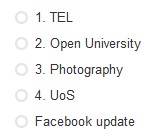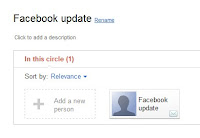-
TheInterviewr: A Really Easy, Fast, Free Way to Record Telephone Interviews
TheInterviewr is a new mashup that makes it super, super simple to record telephone interviews online using your existing telephone. It is a dream come true and for now at least - it's free.
The system uses APIs from Twilio and Box.net to let users schedule interviews with contacts, enter notes for the interviews and upload associated files to a central place. Then, when it comes time to do the interview, both parties are sent an SMS to remind them it's about to begin. The person performing the interview clicks a button on TheInterviewr website and both peoples' phones are called automatically. Have a conversation, refer to your notes and documents, then click the same button to end the call. A recording will be available to listen back to immediately. It's like magic. -
How Online Education Is Changing the Way We Learn [INFOGRAPHIC]
Over the past decade or so, the Internet has become a huge source of information and education, especially for those who might be short on time, money or other resources.
And it’s not just crowdsourced data collections like Wikipedia or single-topic blogs that encourage individual learning; huge corporations and nonprofits are making online education and virtual classrooms a very formal affair these days.
From the first online classes (which were conducted by the University of Phoenix in 1989) to the present day, when online education is a $34 billion industry, more and more students are finding new life and career education opportunities online. -
What Makes Educational Technology Successful in the Developing World?
What makes some technology so compelling and transformational that it thrives in a school setting and others languish? We've all heard stories of computers gathering dust in storage rooms while students and teachers everywhere have taken to photocopiers, calculators and, of course, cell phones.
One of my most surprising moments upon entering a very basic primary school in rural Ayenhyah, Ghana - a room with no electricity or running water - was being told that the school had a no cell-phone policy. Students have such a hunger for communication that they get their hands on a mobile phone by any means necessary. They keep them charged using the full power of their creativity, hooking them up to the small solar cell powering the community's medical clinic or latching them onto a motorcycle battery. Kids from Botswana to the U.S. to Zambia love to text. -
What Devices Will You Carry in 10 Years Time?
Futurist and author Kevin Kelly posits that in 10 years time, each of us will carry 2 computing devices on us: "one general purpose combination device, and one specialized device (per your major interests and style)." He also predicts that we will wear on average 10 computing things: "We'll have devices built into belts, wristbands, necklaces, clothes, or more immediately into glasses or worn on our ears, etc."
... a blog recording interesting technology or learning-related snippets... or anything else that takes my fancy. If it makes me stop and think, it'll probably end up here!
Wednesday, August 24, 2011
All that caught my eye... 08/24/2011
Monday, August 22, 2011
e-Learning Links 08/22/2011
-
How Are People Using Twitter? [INFOGRAPHIC]
tags: elearning twitter microblogging use users online education learning statistics INFOGRAPHIC
-
The impact of learning technology on students' engagement with their feedback
tags: feedback students learning online elearning efeedback education assessment technology
Friday, August 19, 2011
To my 17 year old self...
First, I'd want to say - let's be honest, you knew that you would get those results - the reason you feel bad is because you feel sad that others are disappointed in you. I know you feel scared about the change and the future that lies ahead. The truth is though, none of this will matter in the long run. You'll end up in a place in life that's just as fine as the 'perfect results' version of your life would have been. The bit you don't realise, is that the university you're going to go to now won't be the end of the story. The degree you're about to take won't make you happy. And, to be honest, you'll loathe just about every bit of your studies. But it's okay. Again, it'll just be one of those things which you'll emerge from at the other end and realise that that didn't really matter either.
Then I'd want to tell me that those results which seem so important. The results that your Head of Sixth Form has asked you if they're enough and you've said 'no', and the conversation has ended there and then. Those results won't even get a mention on your CV in the adult version of your life. You'll vaguely refer to '3 A-level passes' and wince when people mention A-level Maths. But, it still won't really matter.
The thing which you'll realise is that life is a jigsaw puzzle made up of thousands and thousands of pieces with an ever changing picture. And that's exciting. And that's what makes life interesting. And that's why, despite the fact that you think that you'll be done with education when you finish that degree you'll go on to take (and hate). You'll discover that you've only just started learning. And when you've grown up a bit, you'll do another degree. And light a fire of love of learning inside you that you just can't put out. And do another degree. And another. And want to take that passion for learning with you wherever you go.
And you'll know that no matter what, you have it inside you to survive and find a way to find the interesting things in life.
The thing I'd tell my 17 year old me is that this is a blip. A speck. A moment.
And then I'd give myself a jolly big hug.
PS And by the way, 17 year old version of me...
PPS ... I wouldn't change a thing.
[originally posted to my photo journal on 18th August 2011]
Tuesday, August 9, 2011
Sharing images on Twitter
They say:
"Uploading and sharing images on Twitter.com is easy! Below you’ll find a brief how-to and some answers to common questions about uploading images on Twitter - right from your Tweet box!"
... video next, maybe?
Sunday, August 7, 2011
Can I tell you a secret?
 |
| Source: Sarah Horrigan, 2011 |
Well, I get it in that I know approximately how to use it as well as some quick tips to help life on Google+ along. But, shall I tell you what I really don't get about it so far? It's like social networking with your mum in charge.
Firstly, the whole identity crisis thing at the moment. No pseudonyms. What? Why? There is a long tradition of writing being done using a pseudonym going back hundreds of years. From famous authors to performers on stage or those needing / wanting to protect their identity - not using your 'real' name is perfectly acceptable. Only recently I had an experience which made me think again about my decision to use my own name for the various bits of material I share online. I've always tried not to name individuals (though I do mention my children occasionally) unless I have their consent or am writing about something they've publicly created. But you are still liable to things you've written being interpreted in a way you never intended - and that having professional consequences for you in the long term. The temptation to carry on writing but to use a pseudonym instead was strong. In the end, I opted for 'being me'. Despite the knowledge that the things I write could be perceived in a negative light should someone decide to do so, I know that I attempt to write in a personal, reflective and constructive style and I would be happy to discuss with anyone the views and viewpoints I share. 'Me' is still my preference.
But to decree that those who have chosen to use a pseudonym - and especially for those who've built up an online identity which is as 'real' as any other - cannot use a service such as Google+ is bizarre. It's as if someone has just switched on their computer to discover a world beyond the physical and is shocked that the communication paradigms by which they operate no longer need a 'this is my given name' standpoint to function. And function well. Your identity is about the sum of the parts. Your online identity even more so. Using a 'real' name no more guarantees anything about the user than anonymity shields it.
 |
| Source: Sarah Horrigan, 2011 |
If I were using Google+ in a slightly more formal setting, for example as part of a personalised learning environment with Google Apps during some kind of learning activity... well, that level of control could be very handy indeed. But I'm not. And it feels, just as with most formal spaces, somewhat artificial and abstracted from 'real' life.
Perhaps, as I was with Twitter, I'm not being fair. Not giving it enough time. But this isn't 2007 when I
blasted the concept of microblogging. And then spent the next few years repeatedly going 'okay, *now* I get it'. Especially when I realise that critical mass and numbers are everything. With 25 million plus users already, Google+ has 'success' scrawled all over it. Rapid growth. Mainstream adoption. A familiar concept. Integration of other services. The power of Google harnessed and bulging at the seams.
It's just not doing it for me.
Google+ stop trying to get me to tidy my room into pretty circular piles and behave 'nicely' with my nice little name tag on.
Both the real and online versions of me are kinda irritated right now.
PS Promise you won't tell anyone my little secret? 'kay?
Sunday, July 24, 2011
Faced with...
... I don't know if I would have had the guts to take on that level of debt
... I don't know that if I'd left the decision until I was more sure of myself, that I could have taken the hit on my earnings
... I don't know whether it would have paid off in the long run
... I don't know whether the pressure to 'get value' would have trumped the need to grow as a person
... I don't know whether I would have felt the freedom to continue exploring my learning after university
... I don't know whether I would have done a postgraduate qualification
... I don't know that it would have been worth it.
I just don't know.
I do know that fees of £5000 a year from the Open University would have put my employer off sponsoring me. Which would have closed the door to the tutoring I started the year after my first course with them (I already had a degree from another university). Which would have closed the door to progression in a career that really did suit me. Which would have meant that I wouldn't have been able to take the higher degrees I needed for the profession I'm in. Which would have meant I wouldn't be working in Higher Education now.
Debt. Value. Money. Fees.
Learning? Changing lives? Those factors are apparently, are now secondary to everything else. We talk about improving 'employability' - and I get that. Now. To an extent. But, I don't know that my 17 year old self would have understood it. I don't know that I understood terribly much at that age. When I graduated, aged 20, I don't think that I'd made that link either. I think I probably thought the degree itself was the thing which got me the job. It didn't. But I wonder if it would have been better had I carried with me the panic that this was a once-only 'investment in my future' and, on finding myself on a degree which I couldn't really cope with... well... what would I have done with that? I can't see that version as better. I also don't like the version which says 'explain better to 17 year olds what they're taking on and the responsibility of their choices will be more solidly based'. Because the 17 year old version of me is nothing like the 36 year old version. And to be tied to the choices I made then for good? Well... that is a scary proposition.
If life long learning is about flexibility and growth... how does shackling people with debt and the pressure of high-stakes choices encourage that?
Faced with fees of £9000 a year, I'd question the worth of Higher Education.
Tuesday, July 12, 2011
Google + blundering in the dark equals...

1. Circles seem to breed if you're not careful. Less is more. And less which get used in a purposeful way is even more than that!
2. Number your circles so that they sort in the order you want. By default, system created circles (i.e. Friends, Acquaintances, Following) sort above your numbered circles if you don't give them a number... so number those too!
3. The only formatting you can apply to text is bold, italic and strikethrough (thanks AJ Cann for that!) - to do that, just pop a couple of asterisks around the word you want emboldened... *bold* = bold ... for italic it's... _italic_ = italic and strikethrough is... -strikethrough- =
4. Control your email notifications by going to Account settings > Google+ then adjust the notifications to suit.
 5. Post from Google+ to Facebook by going to their mobile site, copying your unique Upload via email address, go back to Google+ create a circle and call it something like 'Facebook update', then paste in the email address you just copied to the 'add a new person' field. Then, when you want to send something to Facebook, just share it with your Facebook update circle.
5. Post from Google+ to Facebook by going to their mobile site, copying your unique Upload via email address, go back to Google+ create a circle and call it something like 'Facebook update', then paste in the email address you just copied to the 'add a new person' field. Then, when you want to send something to Facebook, just share it with your Facebook update circle.6. To quickly see all the people you've added to a circle, go to circles, right click and select 'View circle in tab'...
7. ... once they're in a tab, you can select the ones you want to remove or drag to another circle (or even block en masse)
8. Only the things you +1 externally live in your +1 tab on your profile
9. If you want to see how your profile looks to others, there's a little 'view profile as' link on your profile page where you can see what people can view from within Google+ and what everyone else sees .
10. Sparks are good! Too lazy to sift through the 101 RSS feeds you enthusiastically subscribed to? Just type in a search term and it'll pull up related content. If it looks like something you want to see in the longer term, then pin the interest and you'll see it on your main Google+ page.
11. Mute annoying posts by using the dropdown arrow next to the post and selecting mute (or block the individual if you really want to!)
12. If you've uploaded more than one profile picture, you can toggle between pictures on your profile page, just by clicking on your picture.
13. Don't forget to explore the privacy options - make sure you have your profile under control... reveal the information you want to reveal and no more! Share the posts you want with the people you want... and control whether or not they can comment / reshare. Make active choices with this stuff!
That's about it at the mo. It's obviously a system under development. It doesn't quite feel like a rival to Facebook to me. Or a Twitter replacement. Or a Skype replacement. It doesn't really feel like any one thing as yet. It feels like a shell for other things. But, unlike Google Wave which was chaotic and frenetic, it has an order which feels more able to be useful.
... though I still have the nagging feeling that I'm being sucked into the big Google Machine with every click...
Saturday, June 18, 2011
Rigor ends in rigor mortis...
Always with the quick fix. Always with the achievement of a standard which can be measured. It doesn't matter that people come out of education with a dislike of learning. A lack of confidence in their own potential. Or their ability to grow and develop. No. What we need is 'more rigor'.
What's so bad about that? I mean. Shouldn't things be more rigorous? Isn't that better? Well... a good place to start is to look up what 'rigor' means in the dictionary...
Rigor: 1. harsh inflexibility in opinion, temper, or judgment
(Source: Merriam-Webster)
Oh, and if you're wondering, the alternatives for it aren't much better.
Is this really what we want for children's learning? Inflexibility in an age where to survive you need to be flexible? Or are we considering rigor as 'a condition that makes life difficult, challenging, or uncomfortable'? Still not looking massively attractive.
Now, I know by treating these kind of statements literally it could be argued that I wasn't being fair. That what he actually means is that we need to have 'better standards' for our qualifications. But what does *that* mean either? Qualifications don't equate to knowledge. They don't equate to a critical understanding. Fact retention or a test of memory in a 'rigorous' exam doesn't mean that you're more prepared to face a challenging, changing and complex world.
What I learned when I was at school was how to be invisible. This isn't strictly true... because it wasn't always like that. I was a curious child when I was little. Could spend hours reading or creating things. Loved finding out how things worked. But then secondary school happened. It was a vast sea of children and with its increased 'rigor' and reliance on tests, streaming and comparisons... I disappeared. I learned instead how to avoid the teacher's radar and survive. On paper I was one of the 'good' pupils. I got the 'good' GCSEs I needed. I got my A-Levels. I did a degree.
I didn't learn a damn thing that mattered.
How could I go through 16 years of education from 4 to 20 and, 15 years later, barely remember a thing from all those years? I have a degree in Economics - but I couldn't talk to you intelligently about Economics. On paper I can speak French and German. Laughable. I have an A-Level in Maths... but an allergy to trigonometry.
Only when I was in my mid-twenties did I realise that I could have a voice. That it was okay to be wrong. That the qualifications I'd been led to believe were all important and that I *had* to have weren't the door opener they were made out to be. That being 'good at school' wasn't the same as being good at learning. Only in my mid-twenties did I realise what I was interested in and had the intrinsic motivation to take myself to other more interesting places. I walked out of University aged 20 thinking 'I'm done with education'. Well, in many ways that's still right. The difference is that I have a further three degrees now... and I'm only just started with learning.
Rigor in education? On the list of important things about learning it is very, very low down the list. Apparently though, Gove would also like to see the influence of business as well as rigor...
Gove would welcome school heads taking a lesson from business: "We now have great headteachers who will become educational entrepreneurs. They will build a brand and create chains."(Source: The Guardian, 18 June 2011)
Build a brand and create chains.
Build a brand. Create chains.
This almost leaves me speechless. Instead, I think that an author whose work I rather like can express some of my feelings better than me...
Learning. What is so wrong with learning? Messy, creative, exciting, enjoyable, fun, stimulating, puzzling... learning? You don't need a factory-like educational experience to learn. In fact, I wouldn't want an experience like that.
Yet here we are again. Governmental calls for rigor.
Real learning looks like it's about to enter a state of rigor mortis...
Thursday, June 16, 2011
Universities are...
Friday, June 3, 2011
RIP older browsers, Google ain't playing any more...
Those using IE7, Safari 3, Firefox 3.5 and their predecessors to view Gmail, Google Calendar, Talk, Docs and Sites will then lose some functions.
Eventually, it warned, these web services will stop working for those sticking with older browsers.
The move is part of a trend to stop the use of ageing browsers which can be insecure and not sophisticated enough to handle the latest web technologies."


